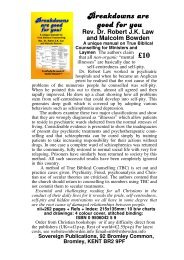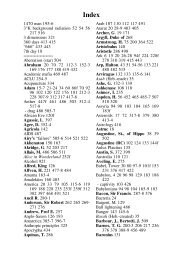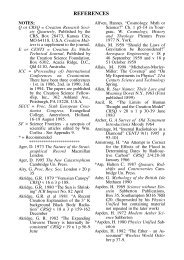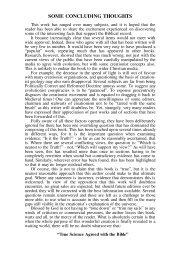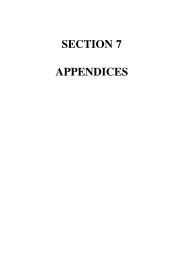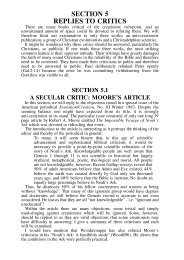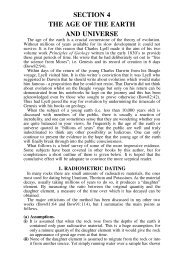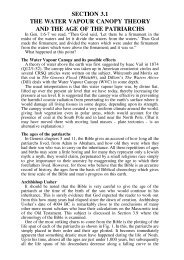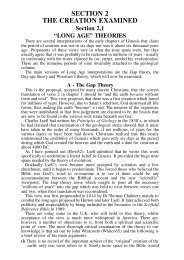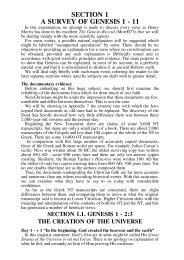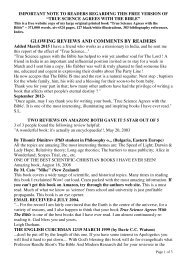TSAWTB Section 6 - Interlude - A Miscellany of Items
True Science Agrees with the Bible, Section 6 - Interlude - A Miscellany of Items (pp. 250-288)
True Science Agrees with the Bible, Section 6 - Interlude - A Miscellany of Items (pp. 250-288)
Create successful ePaper yourself
Turn your PDF publications into a flip-book with our unique Google optimized e-Paper software.
252 <strong>Section</strong> 6 - <strong>Interlude</strong><br />
SECTION 6.2<br />
MENDEL’S RESULTS “TOO GOOD TO BE<br />
TRUE”<br />
Whilst in a humorous mood, the following might be <strong>of</strong> interest also.<br />
It is a little known fact that the results Gregor Mendel achieved in his<br />
experiments with breeding varieties <strong>of</strong> peas to prove his law <strong>of</strong> genetic<br />
inheritance were actually far too accurate to be true (Annals <strong>of</strong> Science v1<br />
p115). They should have been much more wide <strong>of</strong> the ideal 1:4 ratio than that<br />
which he reported in his paper. By way <strong>of</strong> light relief, the following article<br />
entitled “Peas on Earth” appeared in a pr<strong>of</strong>essional journal and was repeated<br />
in Betrayers <strong>of</strong> the Truth (Broad:33)<br />
In the beginning there was Mendel, thinking his lonely thoughts<br />
alone. And he said: “Let there be peas”, and there was peas and it<br />
was good. And he put the peas in the garden and saying unto them<br />
“Increase and multiply, segregate and assort yourselves independently”,<br />
and they did and it was good. And now it came to pass that<br />
when Mendel gathered up his peas, he divided them into round and<br />
wrinkled, and called the round dominant and the wrinkled recessive,<br />
and it was good. But now Mendel saw that there were 450<br />
round peas and 102 wrinkled ones; and this was not good. For the<br />
law stateth that there should be only 3 round for every wrinkled.<br />
And Mendel said unto himself “Gott in Himmel. An enemy has<br />
done this. He has sown bad peas in my garden under the cover <strong>of</strong><br />
night.” And Mendel smote the table in righteous wrath saying<br />
“Depart from me, you cursed and evil peas, into the outer darkness<br />
where thou shalt be devoured by the rats and mice.” And lo it was<br />
done and there remained 300 round peas and 100 wrinkled peas,<br />
and it was good. It was very, very good. And Mendel published.<br />
SECTION 6.3<br />
“ALICE IN WONDERLAND” AND EVOLUTION<br />
Lewis Carroll’s books Alice in Wonderland and Through the Looking<br />
Glass have delighted children and adults for many generations all over the<br />
world. Characters and sayings in his strange world <strong>of</strong> topsy-turvey logic have<br />
been used to express many facets <strong>of</strong> life - Tweedledum and Tweedledee; the<br />
Mad Hatter; “Jam yesterday and jam tomorrow, but no jam today,” - to<br />
mention just a few.<br />
However, few realise that almost every character in his books was a (not so<br />
gentle) lampoon <strong>of</strong> many <strong>of</strong> the famous people he knew. This has been<br />
researched by Jones and Gladstone in their interesting book The Red King’s<br />
Dream (JoneJ95).<br />
Lewis Carroll was the pen-name <strong>of</strong> Charles Lutwidge Dodgson, a<br />
mathematics don at Oxford who loved word-plays, puzzles and puns etc. His<br />
derived his pen-name from Charles = Carollus and Lutwidge became Lewis.<br />
Because <strong>of</strong> a stammer he would announce his name as Do-Do-Do-Dodgson,<br />
and so became “Dodo” to his friends - and one <strong>of</strong> the many characters he used<br />
in Alice.<br />
The Red King’s Dream is somewhat rambling in style but we would<br />
recommend it to the reader interested in tracking down who and what in the



